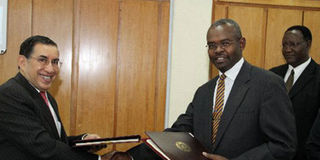Development expenditure frozen until House meets

Arab Bank for Economic Development on Africa (BADEA) Director General Abdelaziz Khelef (left) with National Treasury Principal Secretary Dr Kamau Thugge (right) during the signing of the loan agreement for Oloitoktok water supply and sewerage project at the Treasury on September 24, 2013. Development expenditure by ministries has been frozen until Parliament approves a mini budget proposed to cut luxury spending. PHOTO | DIANA NGILA
What you need to know:
- This, according to the Treasury, ensures that ministries, departments and government agencies do not spend beyond their revised levels which must be approved by the National Assembly through the supplementary estimates
- This therefore means that ministries will have to work with only the money that they were to receive between July and March this year before Parliament approves a mini budget that was drafted by treasury to meet new expenditure demands
- The committee was expected to start deliberating on the new estimates on Thursday before presenting them to parliament as it reconvenes in February, but the parliamentary committees are yet to start meeting properly
Development expenditure by ministries has been frozen until Parliament approves a mini budget proposed to cut luxury spending.
Parliament reconvenes next month to reconsider some of the allocations to ministries.
In a December 17, 2013 letter to Cabinet Secretaries, the national Treasury, through Principal Secretary Kamau Thugge, said: “The ministries will not be allowed to access their fourth quarter allocation until the estimates are approved.”
The freeze exempts salaries, rent, electricity and water.
The ministry has also put a freeze on new staff recruitment. In addition, the purchase of office furniture, computers and other equipment has also been frozen. Also affected are promotions and pay raises for public workers.
This, according to the Treasury, ensures that ministries, departments and government agencies do not spend beyond their revised levels which must be approved by the National Assembly through the supplementary estimates.
The total Exchequer issues for the period July to September 2013 stood at Sh253.5 billion (18.3 per cent of Exchequer to net estimate) compared to Sh231.7 billion (19.2 per cent of Exchequer to net estimates) released in the same period last financial year.
In the mini budget, Treasury is seeking to raise a whopping Sh121 billion needed to pay for the salaries of teachers, lecturers, health workers and allowances for the police officers in the current financial year.
FUND DELAYS
This therefore means that ministries will have to work with only the money that they were to receive between July and March this year before Parliament approves a mini budget that was drafted by treasury to meet new expenditure demands.
The current financial year started on a low note with the MDAs facing delays in the release of funds from the National Treasury which was occasioned by the re-organisation of the government structure that saw the number of ministries reduced from forty two to eighteen., exacerbated by the delay in appointment of accounting officers in the relevant ministries.
Overall, the supplementary estimates will see spending by ministries, Departments and other government agencies adjusted in the mini budget to the tune of over Sh121 billion as the treasury seeks to add more money to other ministries while making cuts in others to meet what it calls “ excessive expenditure pressure.
The National Police Service will be the biggest winner in the mini budget proposals where it will receive Sh60 billion to boost security operations under recurrent expenditure and a further Sh2 billion to meet its development expenditure.
INCREASED BUDGET
The Ministry of Defence recurrent budget has also been increased to Sh74 billion from an initial Sh70 billion, making matters security the second biggest winner in the new adjustments.
Another big winner are the teachers after The treasury proposed to give the Teachers Service Commission (TSC) an additional Sh17 billion in the supplementary estimates, increasing the TSC budget for this year to Sh165 billion from an initial Sh148 billion.
The government last year had to contend with a lot of labour unrest from various public service sectors topped by teachers, lecturers, nurses and other public service sectors agitating for better pay.
Appearing before the Budget and Appropriations committee last month, Treasury secretary Henry Rotich said that the ministry had received funding requests for Sh319 billion from ministries before removing non-priority spending on areas such as travel.
The committee was expected to start deliberating on the new estimates on Thursday before presenting them to parliament as it reconvenes in February, but the parliamentary committees are yet to start meeting properly.





